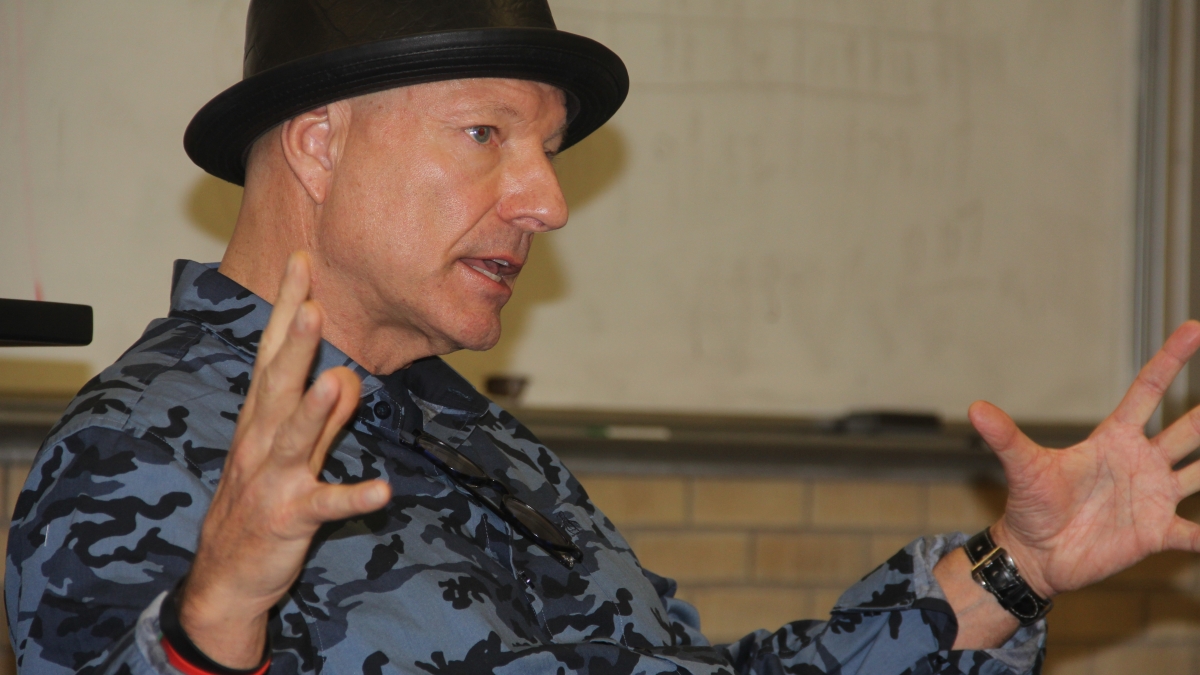Veteran screenwriter visits with ASU film and media students

If you want to trace the history of television from the post network era to today's cable and Internet programming, just follow the money said screenwriter Charles “Chic” Eglee.
Eglee, who is currently the show runner for Netflix’s “Hemlock Grove,” was a featured guest of the Film and Media Studies series hosted by ASU English associate professor Kevin Sandler on Nov. 25 in Tempe. Eglee spoke of his decades long career as a screenwriter and producer, and while most came to hear about the art of screenwriting and the creative process, it soon became apparent that making green is still the Golden Rule in Hollywood.
“When I started out, the industry was ruled by ad dollars and because of many restrictions on television it became the era of least objectionable programming,” Eglee told a group of approximately 75 students.
After a brief stint teaching film history at Yale, Eglee moved to California and worked for legendary producer and director Roger Corman, where he served in a variety of production capacities. In 1984, he moved to television where he joined the writing staff of the NBC medical drama “St. Elsewhere” as a story editor. Later he worked on “Moonlighting”, “LA Law”, “NYPD Blue”, “The Shield” and a host of other shows. He quickly came to the realization that writing revolved around revenue.
“Many of the network shows were structured in four acts to get people to come back from the commercial breaks,” Eglee said. “Executives started to follow demographics, branding and focus groups over storytelling. It was so alarmingly disappointing.”
The Emmy Award-winning Eglee said not all television executives were bad but too many of them interfered with the creative process, citing his stint on James Cameron’s “Dark Angel,” a futuristic dystopian drama starring Jessica Alba that ran on ABC from 2000-2002.
“The show had terrific traction with urban audiences but there was a real disconnect with the executive offices, who thought the show was way too dark and hated the music. They were also very conscious of the fact Jessica Alba was Mexican.” Eglee said. “Suits (executives) tend to want to talk to suits. Writers are the people who tend to present problems and are the dividing wall between them and making large amounts of money for the network. ‘Dark Angel’ suffered as a result of being bent and twisted by executives.”
Eglee said the explosion of cable and Internet programming in the new millennium has made for better television while simultaneously educated executives about demographics and the public about tolerance and acceptance. He also said his current employer, Netflix, while concerned about the bottom line, takes a different approach to lure audiences.
“Netflix doesn’t care about the short-term fix because they want you to watch the entire season and then stick around and think about watching other Netflix programs,” Eglee said. “They (Netflix) are very involved. I liken them to a very good book editor. It’s almost always about clarity.”
The 62-year-old Eglee said while most recent changes in television programming have been positive, he wants to retain some old school methods concerning mentoring younger talent.
“It took me so long to do this job that I feel I have a responsibility to give it all back,” Eglee said. “Everybody gets better if someone schools them along the way.”
For more information on Arizona State University’s College of Liberal Arts & Sciences Film and Media Studies, visit http://english.clas.asu.edu/film.